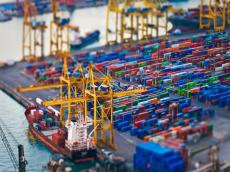|
|
TODAY.AZ / Business
Growth in Baku's trade turnover underscores significance of entrepreneurship in local economy
22 August 2024 [20:45] - TODAY.AZ

By Ulviyya Shahin
Between January and July of this year, Baku experienced a notable increase in trade turnover, which rose by 4.4% compared to the same period last year, reaching a total of 18,744.9 million manats. This positive trend reflects a robust economic performance in the capital city, according to a report from the Baku City Statistics Department.
The report reveals that the growth in trade turnover is driven by both food and non-food sectors:
Food Products, Beverages, and Tobacco: Sales in this category increased by 3.9% year-over-year, totaling 10,392.9 million manats. This growth indicates a steady demand for essential consumer goods, despite broader economic fluctuations.
Non-Food Products: This segment saw a more substantial increase of 5.1%, amounting to 8,352.0 million manats. The stronger growth in non-food sales suggests a healthy consumer appetite for diverse goods, including electronics, clothing, and other durable goods.
The distribution of consumer products across various channels highlights shifts in shopping behaviours and business models:
Enterprises with Legal Entity Status: These entities accounted for 37.1% of consumer product sales. This category includes large retail chains and established businesses that have formal corporate structures.
Commercial Facilities Operated by Individual Entrepreneurs: These facilities represented 48% of sales, reflecting the significant role of small to medium-sized businesses in Baku's retail landscape. This indicates a vibrant entrepreneurial sector contributing substantially to the city's economy.
Commodity Markets: Sales through commodity markets comprised 14.9% of the total. These markets often cater to a diverse range of consumers looking for a variety of goods, from fresh produce to household items.
Consumer Confidence: The growth in both food and non-food product sales indicates a positive shift in consumer confidence and purchasing power. The increased expenditure on non-food items, in particular, suggests that residents are willing to spend on discretionary and durable goods, which is a positive indicator of economic stability.
Entrepreneurial Activity: The significant share of sales through individual entrepreneurs underscores the importance of small businesses in the local economy. It also highlights the dynamic nature of Baku’s retail sector, where individual entrepreneurs play a crucial role in meeting consumer needs.
Market Dynamics: The diversity in distribution channels reflects the adaptability and segmentation of Baku’s retail market. The balance between formal enterprises and individual entrepreneurs shows a mixed-market approach that caters to different consumer preferences and shopping habits.
The continued growth in trade turnover and the increase in both food and non-food product sales suggest a robust economic environment in Baku. If this trend persists, it could lead to further investment opportunities and a more diversified retail sector. Additionally, the focus on expanding both formal and informal retail channels will likely continue to drive economic activity and support the city’s growth trajectory.
Overall, Baku’s trade performance in the first seven months of 2024 paints a promising picture of economic vitality, driven by strong consumer demand and a balanced retail ecosystem.
URL: http://www.today.az/news/business/252020.html
 Print version
Print version
Connect with us. Get latest news and updates.
See Also
- 14 February 2026 [13:45]
Georgian FM spotlights Middle Corridor at Munich Security Conference - 13 February 2026 [14:21]
bp and TPAO sign MoU to explore new opportunities in Türkiye and beyond - 13 February 2026 [14:02]
Russia to begin talks with Armenia on restoring railway links connecting Azerbaijan, Türkiye and Iran - 13 February 2026 [10:22]
SOCAR discusses joint energy projects with US companies and Israeli cooperation - 12 February 2026 [11:20]
Azerbaijan, Ukraine business circles meet at Baku roundtable - 12 February 2026 [10:00]
Azeri Light crude rises to $72.20 per barrel at Italy’s Augusta port - 11 February 2026 [14:20]
How to pay faster with Milliön’s personal cabinet - 10 February 2026 [12:21]
G-77 and China Group hold plenary at UNESCO under Azerbaijan's chairmanship - 10 February 2026 [12:01]
Azerbaijan launches unified digital platform to transform internet services market - 10 February 2026 [10:22]
South Caucasus and Central Asia hold strategic importance for U.S. companies
Most Popular
 President Ilham Aliyev gives interview to France 24 in Munich [PHOTOS/VIDEO]
President Ilham Aliyev gives interview to France 24 in Munich [PHOTOS/VIDEO]
 Trump reverses Obama-era climate ruling, sparking controversy over vehicle emissions
Trump reverses Obama-era climate ruling, sparking controversy over vehicle emissions
 Google launches Gemini 3 AI for research
Google launches Gemini 3 AI for research
 All dots above the "I" and how Baku knows how to place them
All dots above the "I" and how Baku knows how to place them
 The myth of the soulmate: Why love isn’t just “destiny”
The myth of the soulmate: Why love isn’t just “destiny”
 Europe’s largest rocket launches 32 Amazon satellites
Europe’s largest rocket launches 32 Amazon satellites
 AI could replace most office workers within two years, Microsoft executive predicts
AI could replace most office workers within two years, Microsoft executive predicts
